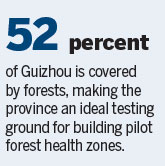First came ecotourism, as people flocked to rural areas to escape noisy, polluted cities. Now, Guizhou province is turning to a new trend experts describe as eco-healthcare.
The southwestern province has established 12 pilot forest health zones that will offer a range of services to help people prevent or alleviate illnesses as they are surrounded by a relaxing natural environment.
The Guizhou Forestry Administration secured a 60 billion yuan ($8.8 billion) loan on Saturday from Agricultural Development Bank of China to improve environmental protection and its forestry industry.
It was not revealed how much of that money will go toward eco-healthcare, but the deal, signed at the Eco Forum Global Symposium in Guiyang, the provincial capital, is expected to boost the pilot project.
The forest health zones - part of a wider effort to make better use of State-protected forests - can help parts of Guizhou and other undeveloped regions eradicate poverty by creating jobs and commercial opportunities for residents, said Liu Dongsheng, deputy director of the State Forestry Administration, during the two-day symposium.
China aims to have 500 health service centers in forest zones nationwide by 2020, according to the central government's five-year forest development plan.

The health zones, which will be combined with entertainment venues and hotels, are seen as potential new growth engines for rural areas, with Chinese travelers already showing great interest in ecotourism.
Liu cited the results of a survey of 5,839 people conducted last year that found 93 percent would be "highly interested" in the idea of forest health services, with "the clean air and natural beauty" the main attractions.
Wang Guofu, a doctor in the geriatrics department at Zhejiang Hospital, said his team has conducted at least four rounds of research since 2010 on how sick elderly patients respond to forest environments, including those with conditions such as high blood pressure and heart disease.
It was found that patients experienced a significant decrease in blood pressure and an improvement in heart function, Wang said at the symposium.
Forests cover 52 percent of Guizhou, which makes the province an ideal testing ground for such health zones, Wang said. However, experts at the symposium said that more detailed policies and standards are needed to make sure the pilot project succeeds.
"We need to learn from other countries with developed (eco-healthcare) industries, such as Japan and the United States. But we need to create unified standards based on our own situation quickly," said Song Weiming, president of Beijing Forestry University.
Contact the writers at [email protected]
